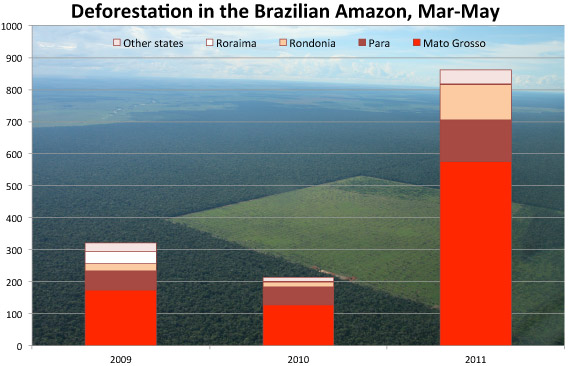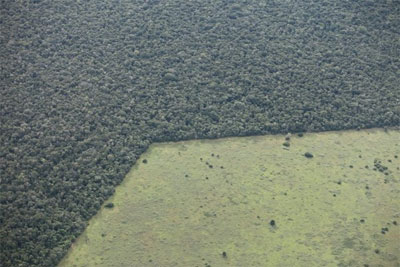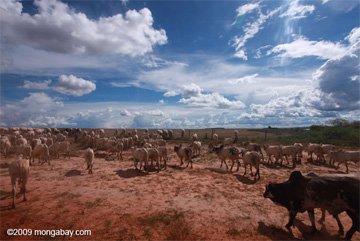|
Perspectives on proposed changes to Brazil’s Forest Code |

A group of prominent scientists has condemned a bill that will potentially weaken Brazil’s environmental laws.
In a resolution issued this week, the Association for Tropical Biology and Conservation (ATBC), the world’s largest scientific organization devoted to the study, protection, and sustainable use of tropical ecosystems, warned that the Forest Code reform bill which recently passed Brazil’s lower house of Congress could reverse progress in reducing deforestation and undermine the country’s standing as a global leader on environmental policy.
“The ATBC is deeply worried about the proposed changes to the Brazilian Forest Code,” said William F. Laurance, former president of ATBC and a current professor at James Cook University in Australia. “Amendments to the Code, which are moving through Brazil’s Congress, would both weaken key aspects of the Code and grant a sweeping amnesty for many of those who have illegally cleared or colonized forested lands in the past.”
“We urge Brazilian President Dilma Rousseff to veto the bill if it reaches her desk, as appears likely. The amended Code would be a serious blow to Brazil’s efforts to limit deforestation in the Amazon and elsewhere in Brazil. And by promoting forest loss and greenhouse gas emissions it could also contribute substantially to global warming.”
  Cattle pasture and forest in the Brazilian Amazon (top), Cattle in the heart of Mato Grosso state (April 2009). Over the past decade more than 10 million hectares – an area about the size of Iceland – was cleared for cattle ranching as Brazil rose to become the world’s largest exporter of beef. Now the government aims to double the country’s share of the beef export market to 60% by 2018 through low interest loans, infrastructure expansion, and other incentives for producers. Most of this expansion is expected to occur in the Amazon were land is cheap and available. 70 percent of the country’s herd expansion between 2002 and 2006 occurred in the region. Photos by Rhett Butler. |
The resolution notes that productivity gains on the 330 million hectares of land currently occupied by rural activities could substantially boost agricultural output and income without needing to clear more native ecosystems. It highlights low productivity cattle ranching as a particularly ripe opportunity for improvement.
“Productivity gains on the 158.8 million hectares occupied by cattle, today with an inefficient mean load of only 1.1 animals per hectare, could provide ground for new agricultural areas,” the resolution states.
ATBC says that “irregularly occupied natural areas” now amount to 97 million hectares, indicating that Brazil could do more to enforce existing environmental laws.
ATBC is therefore urging the Brazilian government “to postpone the approval of a decision regarding the amendments to the Brazilian Forest Code (1.876/99) recently passed by the National Congress until a science based assessment of the ecological impacts of the proposed modifications and their alternatives has been completed.”
Laurance adds that if the bill is approved as is, it would be “a giant step backward for Brazil” which is increasingly seen as a progressive voice on sustainable development and the environment.
- Urges the government of Brazil, particularly the Senate and the President, to postpone the approval of a decision regarding the amendments to the Brazilian Forest Code (1.876/99) recently passed by the National Congress until a science based assessment of the ecological impacts of the proposed modifications and their alternatives has been completed; and
- Urges the Brazilian government to reconsider the negative impacts on biodiversity, ecosystem services, and the long-term viability— sustainability of economic enterprises that can result from the proposed amendments; and
- Further recommends the Brazilian government to follow the sustainable development principles proposed by the Brazilian Academy of Science (ABC), the Brazilian Society for the Progress of Science (SBPC), and the Brazilian Association of Ecological Science and Conservation (ABECO).
RESOLUTION OPPOSING THE PREMATURE ALTERATION OF THE BRAZILIAN FOREST CODE (4771/1965)
Whereas, Brazil is a megadiverse country and supports globally important ecosystems, such as Amazon moist, dry and flooded forests, Atlantic Forest, Cerrado, Caatinga, Pantanal, and the Southern Campos; and
Whereas, Brazilian ecosystems provide important ecosystem services to Brazilians in particular and humanity in general, including climate and hydrological cycle regulation, carbon up—take, water provision, pollutant degradation, crop pollination, medicine, among others; and
Whereas, Brazil has established a large number of biological reserves and other conservation units and has made significant progress in reducing deforestation rates and habitat loss in the last few years; and
Whereas, enforcement of the current Brazilian Forest Code (4771/1965) has played a key role in regulating land use on private and public properties, which ensures landscape connectivity for both plant and animal populations and protects ecosystem services; and
Whereas, scientists have developed new ways to improve productivity which could be applied to Brazil’s 330 million hectares currently dedicated to agricultural and ranching activities thereby reducing the need to clear new lands;
Whereas, the occupation of new natural areas cannot be considered urgent since 329.9 million hectares (38.7% of the national territory) is already occupied by rural activities; and
Whereas, productivity gains on the 158.8 million hectares occupied by cattle, today with an inefficient mean load of only 1.1 animals per hectare, could provide ground for new agricultural areas; and
Whereas, irregularly occupied natural areas has reached 97 million hectares;
Therefore, be it resolved that the Association for Tropical Biology and Conservation, the world’s largest scientific organization devoted to the study, protection, and sustainable use of tropical ecosystems:
Related articles